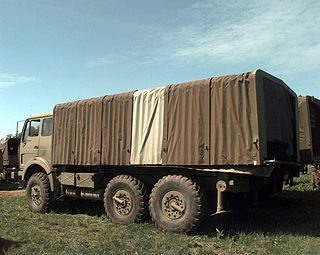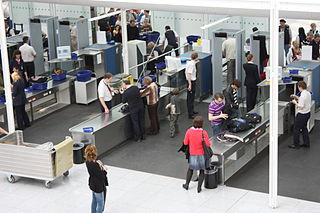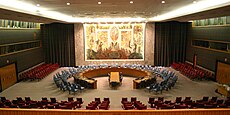
The United Nations (UN) is an intergovernmental organization responsible for maintaining international peace and security, developing friendly relations among nations, achieving international cooperation, and being a center for harmonizing the actions of nations. It is the largest, most familiar, most internationally represented and most powerful intergovernmental organization in the world. The UN is headquartered on international territory in New York City; other main offices are in Geneva, Nairobi, Vienna and The Hague.

The United Nations Security Council (UNSC) is one of the six principal organs of the United Nations (UN), charged with ensuring international peace and security, recommending that the General Assembly accept new members to the United Nations, and approving any changes to its charter. Its powers include the establishment of peacekeeping operations and international sanctions as well as the authorization of military actions through resolutions – it is the only body of the United Nations with the authority to issue binding resolutions to member states. The council held its first session on 17 January 1946.

The United Nations General Assembly is one of the six principal organs of the United Nations (UN), the only one in which all member nations have equal representation, and the main deliberative, policy-making, and representative organ of the UN. Its powers are to oversee the budget of the UN, appoint the non-permanent members to the Security Council, appoint the Secretary-General of the United Nations, receive reports from other parts of the UN, and make recommendations in the form of General Assembly Resolutions. It has also established numerous subsidiary organs.

United Nations Security Council resolution 940, adopted on 31 July 1994, after recalling resolutions 841 (1993), 861 (1993), 862 (1993), 867 (1993), 873 (1993), 875 (1993), 905 (1994), 917 (1994) and 933 (1994), the Council permitted a United States-led force to restore President Jean-Bertrand Aristide and authorities of the Government of Haiti, and extended the mandate of the United Nations Mission in Haiti (UNMIH) for an additional six months.
The Military Staff Committee (MSC) is the United Nations Security Council subsidiary body whose role, as defined by the United Nations Charter, is to plan UN military operations and assist in the regulation of armaments.
United Nations General Assembly (UNGA) resolution 377 A, the "Uniting for Peace" resolution, states that in any cases where the Security Council, because of a lack of unanimity amongst its five permanent members, fails to act as required to maintain international peace and security, the General Assembly shall consider the matter immediately and may issue any recommendations it deems necessary in order to restore international peace and security. If not in session at the time the General Assembly may meet using the mechanism of the emergency special session.
Chapter VII of the United Nations Charter sets out the UN Security Council's powers to maintain peace. It allows the Council to "determine the existence of any threat to the peace, breach of the peace, or act of aggression" and to take military and nonmilitary action to "restore international peace and security".

United Nations Security Council resolution 986, adopted unanimously on 14 April 1995, after reaffirming all resolutions on Iraq and noting the serious humanitarian situation with the Iraqi civilian population, the Council, acting under Chapter VII of the United Nations Charter, established a mechanism whereby Iraqi oil exports would finance humanitarian aid to the country, which later became known as the Oil-for-Food Programme.
United Nations Security Council Resolution 143 was adopted on July 14, 1960. After a report by the Secretary-General, acting under Article 99 of the Charter and a request for military assistance by the President and Prime Minister of the Republic of the Congo (Leopoldville) to protect its territory, the Council called upon Belgium to withdraw its troops from the territory and authorized the Secretary-General to take the necessary steps to provide the Government with such military assistance that the national security forces may be able to meet fully their tasks. The Council asked the Secretary General to report to the Security Council as appropriate.
Chapter V of the United Nations Charter contains provisions establishing the United Nations Security Council.

United Nations Security Council resolution 669, adopted unanimously on 24 September 1990, after recalling Resolution 661 (1990) and Article 50 of Chapter VII of the United Nations Charter, the Council was conscious of the increasing number of requests for assistance have been received under Article 50, relating to international sanctions against Iraq after its invasion of Kuwait.

United Nations Security Council resolution 827, adopted unanimously on 25 May 1993, after reaffirming Resolution 713 (1991) and all subsequent resolutions on the topic of the former Yugoslavia, approved report S/25704 of Secretary-General Boutros Boutros-Ghali, with the Statute of the International Tribunal as an annex, establishing the International Criminal Tribunal for the former Yugoslavia (ICTY).

United Nations Security Council resolution 864, adopted unanimously on 15 September 1993, after reaffirming resolutions 696 (1991), 747 (1992), 785 (1992), 793 (1992), 804 (1993), 811 (1993), 823 (1993), 834 (1993) and 851 (1993), the Council noted the continuing situation in Angola and went on to condemn and place international sanctions on UNITA.

UN Security Council Resolution 883, adopted on 11 November 1993, after reaffirming resolutions 731 (1992) and 748 (1992), the Council noted that, twenty months later, Libya had not complied with previous Security Council resolutions and as a consequence imposed further international sanctions on the country.

United Nations Security Council resolution 917, adopted unanimously on 6 May 1994, after recalling resolutions 841 (1993), 861 (1993), 862 (1993), 867 (1993), 873 (1993) and 875 (1993) and 905 (1994) on the situation in Haiti, the Council imposed further international sanctions on the country after the military authorities refused to implement the Governors Island Agreement to hand over power and instances of violations of human rights.

United Nations Security Council Resolution 1021, adopted on November 22, 1995, after recalling all resolutions on the situation in the former Yugoslavia, particularly resolutions 713 (1991) and 727 (1992), the Council set a date of March 13, 1996, for the suspension of most aspects of the arms embargo on the former Yugoslavia. Resolution 1074 (1996) terminated the remaining measures of the embargo.

United Nations Security Council resolution 1074, adopted unanimously on 1 October 1996, after recalling all resolutions on the conflicts in the former Yugoslavia and in particular Resolution 1022 (1995), the Council terminated all remaining measures against the former Yugoslavia from previous resolutions with immediate effect.

United Nations Security Council resolution 1298, adopted unanimously on 17 May 2000, after reaffirming resolutions 1177 (1998), 1226 (1999), 1227 (1999) and 1297 (2000) on the situation between Eritrea and Ethiopia, the Council condemned continuing hostilities and imposed an arms embargo on both countries.

United Nations Security Council resolution 1624, adopted unanimously at the 2005 World Summit on 14 September 2005, after reaffirming previous resolutions on terrorism, including resolutions 1267 (1999), 1373 (2001), 1535 (2004), 1540 (2004), 1566 (2004) and 1617 (2005), the Council called on all states to co-operate in order to strengthen the security of their international borders by enhancing terrorist screening and passenger security procedures.













